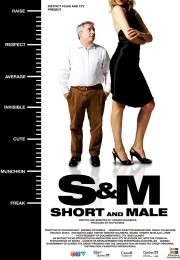|
Home
|
Jan 29, 2024
This week’s themeThere’s a word for it This week’s words heightism theophoric ekphrasis diegetic yesterweek 
S&M: Short and Male, 2008
A documentary about obstacles faced by short men Poster: Instinct Films Previous week’s theme Eponyms A.Word.A.Day
with Anu GargThe English language is one big happy family that has something for everyone. It has a word for someone who is newly rich (parvenu) and one for someone who is newly poor (nouveau pauvre). It has a word for someone who loves dogs (cynophilist) and a word for someone who hates or fears dogs (cynophobic). And in between these words, there are words for almost everything under the sun (and beyond). This week we’ll visit a few terms that make one say, “I didn’t know there was a word for that!” heightism
PRONUNCIATION:
MEANING:
noun: Discrimination based on height, especially the unfair treatment of people who are short.
ETYMOLOGY:
Coined by sociologist Saul Feldman, from height, from Old English hehthu
(height), from heah (high). Earliest documented use: 1971.
NOTES:
Each extra inch in height translates to an extra $800
(Permalink)
in annual earning.
In the US presidential elections since 1900, 21 out of 31 winners were
taller than their opponents. What has been your experience as a short person in life? Did you feel discriminated against? Has it given you any advantage? Share below or email us at words@wordsmith.org USAGE:
“I’m pleased to report I haven’t ordered my elevator shoes yet. The woman
I love transcended her heightism. She’s put away her heels, and clips
articles about the latest trend in relationships: ‘Short Men and Tall
Women: The Last Taboo.’” Joel Yanovsky; What Women Don’t Know About Men; Chatelaine (Toronto, Canada); May 1997. A THOUGHT FOR TODAY:
It is my belief that the writer, the free-lance author, should be and must
be a critic of the society in which he lives. It is easy enough, and always
profitable, to rail away at national enemies beyond the sea, at foreign
powers beyond our borders who question the prevailing order. But the moral
duty of the free writer is to begin his work at home; to be a critic of his
own community, his own country, his own culture. If the writer is unwilling
to fill this part, then the writer should abandon pretense and find another
line of work: become a shoe repairman, a brain surgeon, a janitor, a
cowboy, a nuclear physicist, a bus driver. -Edward Abbey, naturalist and
author (29 Jan 1927-1989)
|
|
Subscriber Services
Awards | Stats | Links | Privacy Policy
Contribute | Advertise
Awards | Stats | Links | Privacy Policy
Contribute | Advertise
© 1994-2025 Wordsmith